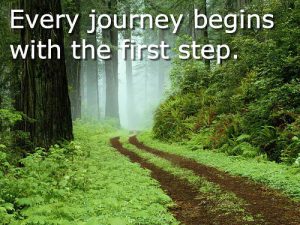Recovering From An Eating Disorder: What To Expect
 Each person is unique, yet we all have much in common.
Each person is unique, yet we all have much in common.
The same may be said about recovery from an eating disorder. Each individual journey is unique and yet all are similar.
In the book 8 Keys to Recovery From an Eating Disorder, authors Carolyn Costin and Gwen Grabb outline the similarities. They found that healing from an eating disorder has 10 phases. Knowing what these phases are can help.
Those just beginning the recovery path can get an idea of what to expect and may take comfort in the realization that it is a gradual process where perfection is not required. Those well along in their recovery may find patience in this list when feeling frustrated or weary.
Reading about the phases may also help family and friends who are supporting someone on the road to eating disorder recovery. It normalizes the starts, stops, bumps, and zig-zags of the journey.
Ten Phases of Eating Disorder Recovery
- I don’t think I have a problem. You may feel your body is yours to manage and just want others to leave you alone. Besides, you know of people who are even thinner than you are.
- I might have a problem, but it’s not that bad. You only vomit occasionally, and your physical exam did not indicate any health problems. The eating disorder is an issue you can live with.
- I have a problem, but I don’t care. You realize that throwing up or not eating is harmful, but it works for you, so you don’t care. Anyway, if you wanted to change, you would, but you don’t want to.
- I want to change, but I don’t know how, and I’m scared. Here, you may realize you want to eat normally but are maybe terrified of gaining weight. Or you may long to stop binging but don’t know were to begin.
- I tried to change, but I couldn’t. You tried doing things differently, and it didn’t work. You told yourself you would stop starving, binging, etc., but continued to do it anyway. It seems unlikely that you will change and recover, so why make the effort?
- I can stop some of the behaviors but not all of them. At this stage you may be able to stop a behavior such as purging but realize if you don’t purge, you will stop eating. Or maybe your diet has become healthier, but you spend three hours a day at the gym.
- I can stop the behaviors but not my thoughts. Although your eating habits are changing, thoughts of food, weight, binging, and body image are still on your mind much of the time. You may still be continually counting calories or weighing yourself.
- I am often free from behaviors and thoughts but not continually. You are feeling fine most of the time but when life gets stressful the unhealthy eating behaviors return. Or, something might trigger old eating disorder thoughts and habits such as trying on swim suits or looking through fashion magazines.
- I am free from behaviors and thoughts. Finally, you eat what you want without guilt and feel OK in your body most of the time. One day you may realize that you are no longer having eating-disorder-related thoughts and urges.
- I am recovered. For quite a while, you have not experienced the feelings, thoughts, or behaviors associated with the eating disorder. You have accepted your body’s natural size and shape. The disorder seems a thing of the past.
Photo credit: Melody Campbell
 Eating Disorder Self Test. Take the EAT-26 self test to see if you might have eating disorder symptoms that might require professional evaluation. All answers are confidential.
Eating Disorder Self Test. Take the EAT-26 self test to see if you might have eating disorder symptoms that might require professional evaluation. All answers are confidential.